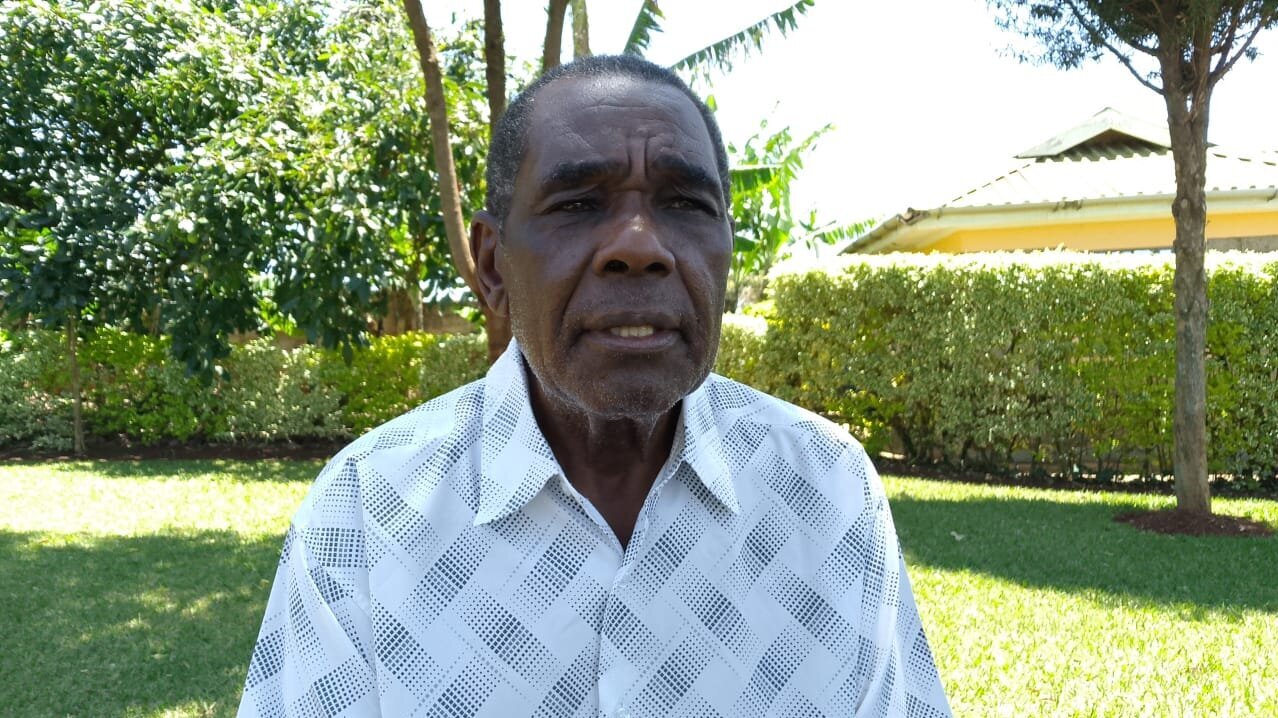Former spy chief warns of instability over VIP security withdrawals

Former National Security Intelligence Service (NSIS) Director Esau Kioni addressing the media at his Kagere home in Othaya, Nyeri County. Photo/James Murimi
Former National Security Intelligence Service (NSIS) Director Esau Kioni has raised the alarm over what he terms a dangerous trend of withdrawing State security from certain leaders, warning it could plunge the country into instability.
Mr Kioni said the frequent complaints by public figures about the removal of their security details are a red flag that should not be ignored by President William Ruto’s administration.
“If the government continues to withdraw security from VIPs, it will lead to an outcry not just among leaders, but from ordinary Kenyans as well,” Mr Kioni cautioned.
“The public will begin to question, ‘If even VIPs aren’t safe, what will happen to the rest of us?’ That kind of fear can escalate quickly.”
Mr Kioni, who served as a security advisor to the late President Mwai Kibaki, emphasized that such moves send the wrong message, potentially eroding public trust in the government’s ability to protect its citizens.
“I hope President Ruto, in his capacity as Chair of the National Security Council, listens to these concerns and takes the necessary steps,” he said. “If ignored, this issue could easily spiral into a broader national security crisis.”
The former spy chief urged the country’s security agencies to offer the President candid advice on the implications of revoking security for high-profile individuals.
“The relevant security organs must step up and advise the President that this approach is not only unsustainable but also dangerous,” he said.
“This is not about politics, it’s about safety.”
Mr Kioni criticized leaders in both the Executive and Parliament who, he said, appear to celebrate when their political rivals are stripped of State protection.
“Those who are mocking others today could be the victims tomorrow,” he said.
“If you’re used to State security and it’s suddenly removed, that’s often the first warning sign that your life could be in danger.”
Citing past cases, Mr Kioni hinted at incidents where harm befell leaders after their security was withdrawn, although he declined to give specific examples.
“We’ve seen such things happen before. I personally know of cases where serious consequences followed. Unfortunately, when things go wrong, it’s the government that ends up bearing the blame,” he said.
His comments come in the wake of recent complaints from several high-profile politicians alleging that their security details have been unceremoniously removed.
Former Deputy President Rigathi Gachagua is among those who have voiced concern.
In a recent letter addressed to Inspector General of Police Douglas Kanja, Gachagua demanded the immediate reinstatement of his security, saying his life was in danger.
He claimed that his personal safety had been compromised.
Former Public Service Cabinet Secretary Justin Muturi said that his security had been withdrawn without explanation.
“I feel exposed,” Muturi said. “This is not just about me, it sets a worrying precedent.”
Githunguri MP Gathoni Wamuchomba and Trans Nzoia Governor George Natembeya have also alleged that their security has been scaled down, adding their voices to a growing chorus of concern.
However, some political analysts speculate that the moves may be politically motivated, especially as tensions rise ahead of future elections.
Kioni warned that the government’s current approach risks creating a climate of fear and uncertainty.
“When people in leadership begin to feel unsafe, that uncertainty trickles down to the general population,” he said. “What starts as a political issue can quickly morph into a national security nightmare.”
He called on all stakeholders, including Parliament and civil society, to take the matter seriously and push for a consistent, non-partisan approach to State protection.
“We must not allow political differences to interfere with the safety of public servants,” Kioni said. “Security should be based on threat assessment, not political loyalty.”
As the debate continues to heat up, eyes are now on President Ruto and his security team to address the growing concerns and ensure that national security remains intact for all, regardless of political alignments.

Be the First to Comment